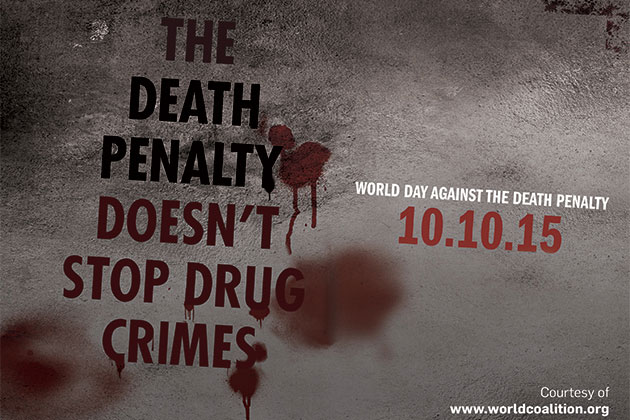The abolition of the death penalty worldwide is one of the flagship objectives of the EU’s human rights policy. It features as one of the top priorities in the recently adopted Action Plan on Human Rights and Democracy (2015-2019).
In the fight against death penalty, the EU disposes of and uses constantly a wide set of diplomatic and cooperation assistance tools, such as statements, demarches and Human Rights Dialogues.
Where the death penalty still exists, the EU calls for its use to be progressively restricted and insists that it be carried out according to internationally-agreed minimum standards. The EU continues to encourage all States to accede to the Second Optional Protocol to the International Covenant on Civil and Political Rights, the most fundamental UN international instrument for the abolition of death penalty.
The EU is the leading institutional actor and lead donor to the efforts by civil society organizations around the world in the abolition of the death penalty. The abolition of the death penalty is one of the thematic priorities under the European Instrument for Democracy and Human Rights (EIDHR).
The EU is also the first regional body to have adopted rules prohibiting the trade in goods used for capital punishment (and torture and ill-treatment), as well as the supply of technical assistance related to such goods.
In multilateral fora, the EU led an intensive lobbying campaign for the UN General Assembly resolution on a “Moratorium on the use of the death penalty”. In December 2014, the UN General Assembly adopted the resolution with an unprecedented number of 117 votes in favour whereas the number of co-sponsors rose to a record number of 95.
On the World/Europe Day against the Death Penalty, Thorbjorn Jagland, Secretary General of the Council of Europe and Federica Mogherini issued a Declaration on behalf of the EU and the CoE.
About the World Coalition against the Death Penalty
The World Coalition Against the Death Penalty (WCADP) is planning a number of events for the 13th World Day against the Death Penalty, focusing this year on the death penalty and drug-related offences. While opposing the death penalty in all circumstances, abolitionists are also committed to seeing existing international human rights standards implemented. Among these is the restriction of crimes punishable by death for the most serious crimes- intentional killing.
It will also be a good time to plan for the UN General Assembly Special Sessions (UNGASS) on drugs to be held in New York in April 2016 which will focus on how the international drug control regime contributes to broader UN objectives such as public health, human security, social and economic development, and human rights, including the abolition of the death penalty for drug crimes.





